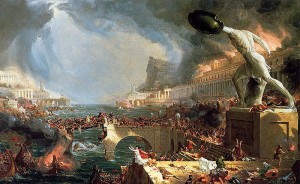
The Course of Empire by Thomas Cole
As a species, humans are genocidal.
This is a fact. We are genociding multiple species right now, we have genocided many in the past. We are driving so many species to extinction that the fossil record will show this as a great die-off.
And, if we decide one part of our own species isn’t “of the tribe,” well, we happily genocide them too. (A genocide is ongoing in Yemen, and, despite all our caterwauling about “never again,” we are doing nothing about it. Indeed, the US is aiding and abetting it.)
Humans commit genocide, a lot.
Now there are two ways to look at this tendency: with a view to free will and a view without. If humans don’t have free will, well, we have no moral culpability. It’s like blaming a fox for killing all the hens in a hen-house even though he won’t eat most them: He can’t help himself. In this model, humans are just animals and are no different from any other in terms of moral culpability. We’re biological machines governed by cause and effect.
That doesn’t make those we kill any less dead but it does mean feeling remorse is silly. We’re serial killing mass murderers, but it’s not our fault. We might as well be bacteria in a petri dish, eating everything they can, polluting the dish, and wiping themselves out amidst their own waste.
Ourselves.
The other model suggests that human beings do have some control over ourselves. Some ability to use reason and reasoned emotion to control ourselves. We can model the past, present, and future and we can act to manage that future. We identify with and feel the pain of not just fellow humans but that of animals and even plants, and we can act on those feelings to reduce the amount of pain we cause.
Because whether we have free will or not, this we know: Suffering is real.
Even from a completely self-interested point of view, we know what we’re doing is bad: The species we’re killing are important for the health of eco-systems upon which we rely. If the ocean plankton go away, we are so screwed. If various other ecosystems collapse, well, we rely on them to keep the world habitable by higher lifeforms.
And the genetic wealth we are destroying, which we could use with our unfolding biological technologies, is incalculably large: Miracle cures and genetic modifications we will never know.
All this leaves aside the non-trivial possibility we could wipe ourselves out and the reasonable chance that we will destroy our civilization and plunge ourselves into a dark age.
If the other species could vote, surely most would vote to have us be the next genocide victim, in order to spare so many other species.
Looking at all of this leads to a fairly simple conclusion: We can’t handle the technology we have. We do not have the ability to manage ourselves. As a species, we cannot control our breeding, or manage limited resources and sinks, nor plan for any future more than a few years out. When we broke the Malthusian trap, we set ourselves up for disaster. When we learned how to exhume large amounts of carbon and burn it, we set most of the world’s species up for catastrophe.
We are dangerous to everyone, including ourselves, not primarily out of malice (though there is plenty of that) but out of selfishness, greed, stupidity, and short-sightedness.
And it’s not clear we can learn. Oh, individuals and groups can learn. The lessons of the Great Depression were learned well by those who were adults then, but they couldn’t pass those lessons on to their kids and grandkids, who went on to pursue essentially the exact same policies which caused the Great Depression (as well as fascism).
So if we make it through the great climate change and ecological collapse and learn our lesson, how long will it be before the grandkids or great-grandkids say, “Oh, we would never do that again. Let’s loosen some regulations, they’re stupid and get in the way of making a profit!”
As a species, we now have three great tasks:
- Get through the ecological issues barreling down on us
- Learn how to live in space and get off the planet so all our eggs aren’t in one basket (jump to more petri dishes!)
- Most importantly, learn how to create stable, sane societies that aren’t a menace to themselves and every living creature around them.
The first two are clearly possible (though we may not manage them).
The third?
I don’t know. Can humans truly learn? Or are we just bacteria in a petri dish, too stupid to control ourselves?
The results of the work I do, like this article, are free, but food isn’t, so if you value my work, please DONATE or SUBSCRIBE.

 There are two major, interrelated environmental problems today. The first is climate change, the second is environmental collapse. The ecosystem is a very complicated web, from single celled organisms on up to apex predators and humans. When you unbalance it, when you take out chunks, the consequences cascade through the ecosystem, and it is possible for ecosystems to collapse, losing the ability to support higher forms of life, while the makeup of the lower parts changes significantly.
There are two major, interrelated environmental problems today. The first is climate change, the second is environmental collapse. The ecosystem is a very complicated web, from single celled organisms on up to apex predators and humans. When you unbalance it, when you take out chunks, the consequences cascade through the ecosystem, and it is possible for ecosystems to collapse, losing the ability to support higher forms of life, while the makeup of the lower parts changes significantly.